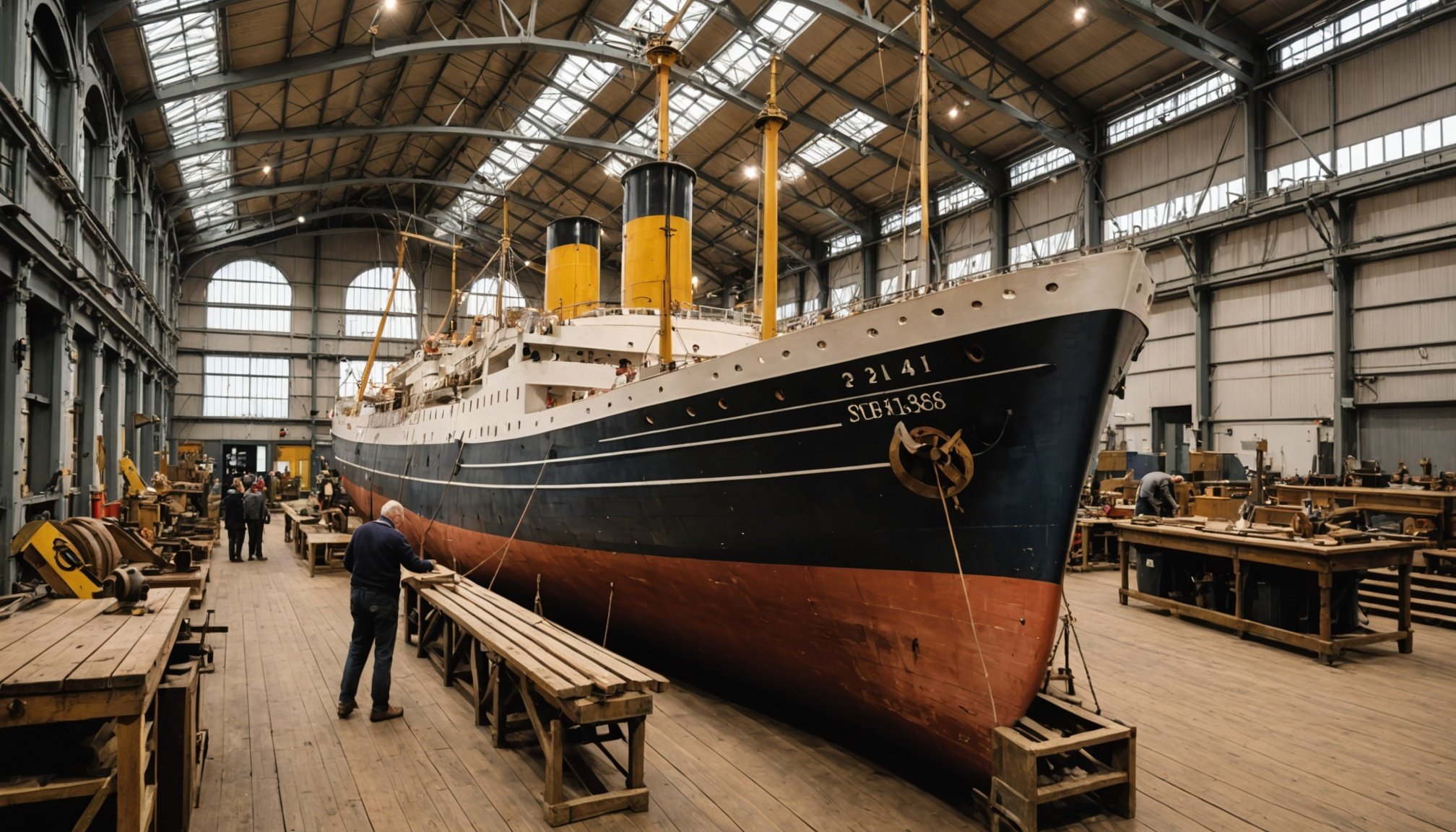Overview of British Shipbuilding Workshops
British shipbuilding has a rich history, with workshops at its very heart. These workshops, rooted in tradition, crafted ships that symbolised Britain’s maritime power. This tradition dates back centuries, highlighting the importance of skilled craftsmanship and traditional techniques. Astonishingly, these shipbuilding workshops were more than mere work sites; they were cradles of invention and craft.
Early shipbuilding techniques involved hand tools and wooden materials, requiring meticulous skill. Craftsmen perfected their art over years, ensuring each vessel was both functional and a work of art. The legacy of these traditions remains relevant even today, as shipbuilding workshops strive to preserve this cultural heritage.
Have you seen this : Dive into Engaging Interactive Workshops: Unveiling the Rich History of British Naval Chart Crafting
In contemporary times, these workshops stand as guardians of history, bringing past methods into modern contexts. They play a pivotal role in maintaining the link between past and present, nurturing cultural identity through restored practices. Cultural preservation thrives in this blend of history and modernity. Enthusiasts and history buffs appreciate the chance to witness these timeless crafts, which continue inspiring new generations of shipbuilders. As such, British shipbuilding workshops are vital in preserving not only techniques but also a profound sense of national pride.
Notable Shipbuilding Workshops in Britain
British shipbuilding’s legacy thrives through its notable workshops, each a blend of history and innovation. These places offer a peek into the intricate art of shipbuilding, captivating both enthusiasts and curious visitors alike.
Workshop Name 1
The Chatham Historic Dockyard stands as a monumental testament to Britain’s shipbuilding prowess. Once a thriving naval hub, it employed techniques that pushed the boundaries of maritime design. Visitors can explore maritime heritage through guided tours, witnessing artisans at work in restored environments. The dockyard’s expansive grounds house the last surviving warships and the Victorian Ropery, famed for its traditional techniques.
Workshop Name 2
Located in Glasgow, the Riverside Museum provides a vibrant look into shipbuilding history on the Clyde. It showcases the unique techniques once heralded by local craftsmen. Interactive displays let visitors experience shipbuilding’s evolution firsthand. The museum’s ship models and audiovisual exhibits offer an engaging, informative journey.
Workshop Name 3
The Portsmouth Historic Dockyard is steeped in naval history. This workshop highlighted British naval superiority with its distinctive strategies in ship construction. Visitors can delve into stories of legendary vessels like HMS Victory. The dockyard offers immersive experiences, sharing tales of craftsmanship that defined an era. Exhibits here blend history and adventure, making it a must-see for maritime enthusiasts.
Capturing the History through Media
The historical narratives of British shipbuilding are vividly brought to life through engaging media. Such storytelling encompasses photography and video documentation, providing a window into the past. These mediums capture the intricate craftsmanship and bustling energy of workshops, making history accessible to a broader audience.
Photography offers a timeless record of traditional shipbuilding techniques, highlighting the meticulous craftsmanship involved. Images of tools, materials, and artisans at work offer an intimate glimpse into the art of ship design, preserving details that words alone cannot convey.
In the realm of video documentation, narratives unfold, allowing viewers to witness traditional techniques in action. Stories of legendary ships and dockyard experiences are brought to life, informing and inspiring new generations. These videos often serve educational purposes, providing in-depth insights into shipbuilding practices.
Social media platforms play a crucial role in promoting shipbuilding heritage today. By sharing videos, images, and stories online, they bridge the gap between shipbuilding’s rich history and modern audiences. This digital visibility rekindles interest in historical workshops and attracts visitors eager to experience the rich cultural tapestry. Thus, media not only documents history but invigorates community engagement with these practices.
Exploring Traditional Shipbuilding Techniques
Traditional techniques in British shipbuilding reveal a fascinating tapestry of craftsmanship, where ancient skills and modernity coexist. These techniques often involve meticulous handcrafting, where skilled shipwrights utilise craftsmanship in every plank and beam.
A detailed overview of classic shipbuilding methods starts with the famous “ship of the line” designs, characterised by robust, wooden hulls and intricate rigging. The selection of materials is paramount; seasoned oak and elm are prized for their durability and workability, forming the backbone of many historic vessels.
In today’s world, traditional techniques blend with modern technology in delightful ways. Shipbuilders now integrate computer-aided design (CAD) with age-old methodologies, enhancing precision and ensuring these time-honoured techniques remain relevant. This fusion creates vessels that are true to their historical designs yet have the strength and efficiency expected by contemporary standards.
Moreover, the role of materials remains central as sustainable forestry practises ensure the continued availability of traditional woods. Both seasoned craftsmen and new generations of artisans play a crucial role in maintaining these skills, keeping the spirit of British ship design alive and inspiring aspiring builders to innovate within these historical frameworks.
Visitor Information and Special Events
Understanding the allure of British shipbuilding workshops includes appreciating their draw for visitors. These notable workshops offer immersive experiences that deepen our connection with maritime history. Whether you’re a history buff or a casual explorer, there’s much to uncover.
Visitor information is crucial to enhancing your experience. Workshops typically operate year-round, but checking specific opening hours and ticket information on official sites is recommended. Many locations offer special tours that provide insights into shipbuilding processes and historical significance, which are not just educational but truly engaging.
Additionally, the events calendar for these workshops is often filled with rich programming. This includes seasonal highlights like maritime festivals, which celebrate shipbuilding culture. These events often feature demonstrations by skilled craftsmen and interactive activities for all ages, showcasing the living tradition of ship design.
Finally, do not miss the special programming tailored to enrich the visitor experience—a celebration of history and modern engagement. Whether experiencing a guided tour or participating in a festival, these offerings ensure that every visit is memorable and insightful, connecting you with Britain’s storied maritime heritage.
Cultural Heritage and Community
Understanding the cultural heritage embedded in British shipbuilding is not just about the past—it’s about how communities today thrive and engage. Shipbuilding is a cornerstone of many local histories, influencing both the identity and the economy of regions across Britain.
The Impact on Local Communities
British shipbuilding workshops left indelible marks on communities, providing employment and fostering vibrant economies. By anchoring local stories within shipbuilding history, these regions preserve invaluable community bonds that connect generations over time.
Events and Festivals
Celebrating this heritage often takes the form of events and festivals that honor shipbuilding culture. These gatherings showcase traditional methods, offering immersive experiences that educate and entertain. From historic reenactments to craftsmanship demonstrations, these events keep shipbuilding traditions alive.
Artisans and Historians
Interviews with local artisans and historians reveal personal stories and insights into the life surrounding shipbuilding. These narratives provide context and depth to the cultural significance of shipbuilding, shedding light on the human element behind maritime achievements.
By focusing on community engagement and celebrating cultural heritage, the shipbuilding workshops provide insights into the social tapestry of their locality, ensuring these traditions continue to inspire and educate future generations.










